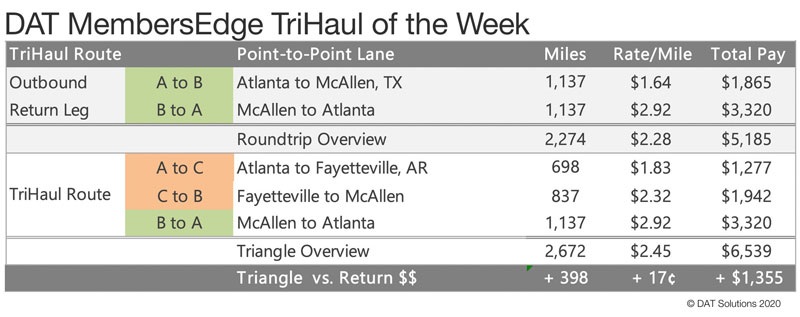With supply chains strained by the impact of the COVID-19 coronavirus, truckload rates were higher for all three equipment types during the week ending March 22.
National average spot truckload rates, March (through March 22)
- Van: $1.85 per mile, up 3 cents from last week and 6 cents higher than the February average.
- Reefer: $2.16 per mile, up 5 cents from last week and 7 cents higher than February.
- Flatbed: $2.20 per mile, unchanged from last week, and up 5 cents compared to February.
Key trends
Rates are up 12% since March 1
The average spot van rate increased on 88 of the 100 highest-volume lanes on DAT MembersEdge compared to the previous week. The line-haul van rate (no fuel surcharge), which entered the month below last year’s average, has jumped 12% since March 1 and is up 16 cents year over year.
- March 1: $1.51 per mile, compared to $1.58 a year ago.
- March 23: $1.70 per mile, compared to $1.54 a year ago.
Replenishment is driving demand
The surge in volume from replenishment activities continues to drive up demand for trucks, as reflected in load-to-truck ratios and rates. The national average van load-to-truck ratio last week was 3.5, up from 3.2 the previous week. That’s the eighth straight week of rising ratios.
We’ll be watching this trend as larger volumes of backlogged freight begin to arrive at West Coast ports from Southeast Asia.
Money on midrange hauls
Any overnight stay involves safe parking, decent food, and other roadside necessities that are in short supply right now. Shippers are paying more for van capacity on “tweener” lanes with lengths of haul in the 250- to 600-mile range.
Examples:
- Memphis to Chicago averaged $2.06 per mile, up 25 cents; Chicago to Memphis added 10 cents to $1.93.
- Atlanta to Columbus, Ohio, averaged $1.78 per mile, up 19 cents; Columbus to Atlanta rose 8 cents to $2.06.
- Columbus to Memphis averaged $1.75 per mile, up 14 cents; Memphis to Columbus gained 8 cents to $2.16.
- Dallas to Houston averaged $2.42 per mile, up 19 cents; Houston to Dallas rose 3 cents to $2.03.
Oh, yeah, it’s produce season
Large-scale shutdowns of schools, restaurants, and other food service venues have focused shippers’ and carriers’ attention almost entirely on retail grocery outlets, including e-commerce. Further, reefers must be loaded “live” with perishable goods, making delays and disruptions even more costly for owner-operators.
In the coming weeks, a new layer of demand will be added to the mix when spring produce harvests begin. Expect reefer rates to remain elevated from now through the end of June. Only six of the top 72 reefer lanes paid less last week than they did the week before.
Tri-haul of the week
Reefer loads from McAllen, Texas, to Atlanta averaged $2.92 a mile last week—not bad—but Atlanta to McAllen paid $1.64.
You can break up that southbound trip into two legs to make a higher-paying tri-haul. That’s a feature of DAT MembersEdge load board that suggests triangular routes.
One option is the 700-mile haul from Atlanta to Fayetteville, Ark., for an average of $1.83 per mile, and then another 837 miles to McAllen for an average of $2.32 a mile.
All told, that tri-haul pays an average of $2.45 per loaded mile and includes 400 more loaded miles than the original roundtrip. That nets out to a nearly $1,350 increase in revenue using the triangular route, bumping the total revenue for the trip to more than $6,500 on roughly 2,700 miles. If it fits your schedule and hours of service, this could be a good option to get you into McAllen for that next high-paying load.

Rates are derived from DAT RateView, which provides real-time reports on prevailing spot market and contract rates, as well as historical rate and capacity trends. All reported rates include fuel surcharges.
For the latest spot market load availability and rate information, visit the load board or tune in to Land Line Now. You can get all of the latest rate information at DAT.com per industry-trends per Trendlines, comment on the DAT Freight Talk blog, or join us on Facebook. On Twitter you can tweet your questions to us @LoadBoards and have your questions answered by DAT industry analyst Mark Montague.
Original Source: https://landline.media/dat-solutions-supply-chain-disruptions-send-rates-higher/
